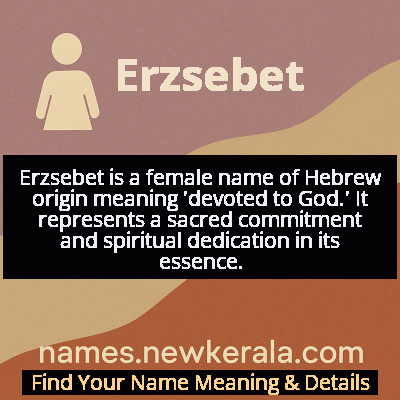Erzsebet Name Meaning & Details
Origin, Popularity, Numerology Analysis & Name Meaning of Erzsebet
Discover the origin, meaning, and cultural significance of the name ERZSEBET. Delve into its historical roots and explore the lasting impact it has had on communities and traditions.
Name
Erzsebet
Gender
Female
Origin
Hebrew
Lucky Number
1
Meaning of the Name - Erzsebet
Erzsebet is a female name of Hebrew origin meaning 'devoted to God.' It represents a sacred commitment and spiritual dedication in its essence.
Erzsebet - Complete Numerology Analysis
Your Numerology Number
Based on Pythagorean Numerology System
Ruling Planet
Sun
Positive Nature
Leaders, ambitious, highly driven, self-reliant, innovative.
Negative Traits
Overly aggressive, domineering, impatient, selfish.
Lucky Colours
Red, orange, gold.
Lucky Days
Sunday.
Lucky Stones
Ruby, garnet.
Harmony Numbers
2, 3, 9.
Best Suited Professions
Entrepreneurs, managers, engineers.
What People Like About You
Courage, determination, leadership.
Famous People Named Erzsebet
Erzsébet Báthory
Countess
Infamous Hungarian noblewoman known as the 'Blood Countess'
Erzsébet Szőnyi
Composer and Educator
Influential Hungarian composer and Kodály method music educator
Erzsébet Galgóczi
Writer
Award-winning Hungarian novelist and socially critical author
Erzsébet Kútvölgyi
Actress
Kossuth Prize-winning Hungarian actress with extensive career
Name Variations & International Equivalents
Click on blue names to explore their detailed meanings. Gray names with will be available soon.
Cultural & Historical Significance
Extended Personality Analysis
Women named Erzsébet are typically associated with strong character traits including determination, loyalty, and deep-seated principles. They often exhibit a blend of traditional values and independent thinking, showing remarkable resilience in facing challenges. Their devotion, as suggested by the name's meaning, manifests not only in religious faith but also in their commitments to family, work, and personal relationships. Erzsébets are frequently perceived as thoughtful and introspective individuals who value meaningful connections over superficial interactions. They tend to be nurturing and protective of those they care about, often taking on supportive roles in their communities. Many display a quiet confidence and inner strength that allows them to persevere through difficulties while maintaining their core values. Their combination of traditional wisdom and modern adaptability makes them respected figures in both personal and professional spheres.
Modern Usage & Popularity
In contemporary usage, Erzsébet maintains its status as a classic Hungarian name with traditional appeal. While it was extremely popular in earlier generations, modern parents often choose it as a distinguished alternative to more fashionable names. The name is particularly favored by families seeking to honor Hungarian heritage and Catholic traditions. Its usage has remained steady rather than trendy, giving it a timeless quality that transcends temporary naming fashions. Outside of Hungary and Hungarian communities, the name is rarely used in its original form, with most international contexts preferring Elizabeth or local variants. Recent years have seen a renewed appreciation for traditional Hungarian names, helping Erzsébet maintain its relevance while newer diminutive forms like Erzsi provide more casual alternatives for daily use.
Symbolic & Spiritual Meanings
Symbolically, Erzsébet represents profound devotion, cultural continuity, and inner strength. The name embodies the concept of sacred commitment, reflecting its core meaning of being devoted to God, which extends metaphorically to dedication in all aspects of life. It carries connotations of noble character and royal dignity, connecting bearers to a lineage of strong historical figures. In Hungarian cultural context, the name symbolizes the preservation of national identity and traditional values. The symbolic meaning also encompasses resilience and the ability to maintain integrity through challenging circumstances. Erzsébet represents a bridge between faith and action, tradition and progress, personal conviction and compassionate service to others. The name suggests a person who honors their heritage while navigating modern life with wisdom and purpose.

